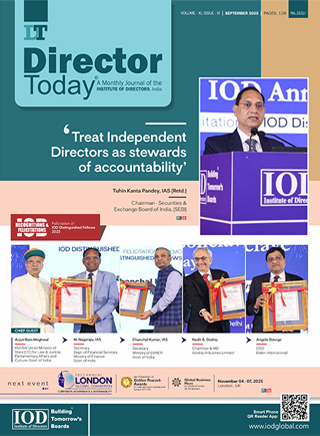Corporate Governance in the USA

Boardroom Essentials: Risk, Culture, and Strategy in 2025
Insights from the National Association of Corporate Directors
Like their fellow directors all over the planet, corporate directors in the United States today are facing a series of increasingly disruptive forces ranging from artificial intelligence, blockchain, and cybercrime to XBRL (eXtensible Business Reporting Language), yield dives, and zombie debt. How can board leaders respond to these trends in a way that builds long-term value for owners and other stakeholders? Tapping into legacy approaches won't be sufficient. When it comes to overseeing corporate risks and identifying corporate opportunities, we are all operating on new terrain.
In this increasingly complex environment, US boards are strengthening their oversight skills and capacity across a number of key areas. The following six areas will be areas of focus for many boards in 2025.
Board agenda setting
As the number of issues being monitored by boards grows, so too have the items on board agendas. Some areas of intense interest for our 24,000 members include shifting economic conditions, cybersecurity, artificial intelligence, evolving regulatory requirements, and the ongoing competition for talent. Faced with a wide array of topics, it is vital that boards carefully structure and plan their overall board calendar and agenda to enable meaningful discussions and decision making.
By continuing to educate themselves on the issues facing them, directors will be able to see the risks and opportunities embedded in the changes they are facing.
Board composition
Two-thirds of US directors responding to NACD's 2024 Trends and Priorities survey reported increased board effort to expand proxy statement information about board composition, board diversity, and director skills and experience. As boards and nominating committees seek to identify the best candidates to serve on the board, they continue to recruit a demographically diverse array of individuals with a leadership track record, relevant industry experience, and financial acumen, among other attributes. Some have added to their wish list a new qualifier, namely certification. After granting certification to more than 2,000 directors over the past five years, NACD is finding that individuals who hold this designation tend to be sought by boards. An increasing number of proxy statements are describing their director nominees as being a “National Association of Corporate Directors certified director.”
In this increasingly complex environment, US boards are strengthening their oversight skills and capacity across a number of key areas.
Board culture
Culture is another vital concern for boards—both in the company itself and in the boardroom. Seven years ago, in 2017, NACD published the Report of the NACD Blue Ribbon Commission on Culture as a Corporate Asset, and this past year NACD issued a sequel addressing board culture—the 2023 Report of the Blue Ribbon Commission on Culture as the Foundation: Building a High-Performance Board. We defined board culture as shared values, beliefs, assumptions, experiences, and expectations that influence behavior in the boardroom and manifest themselves in board norms, protocols, and practices. Many problems that appear to be purely financial or strategic in nature can be traced to human problems such as extremes of groupthink or mistrust and conflict enabled by poor organizational culture. NACD encourages boards to define and encourage an optimal culture—for example, one that encourages mutual respect and constructive skepticism as vital to a highly effective boardroom.
Board development
Ongoing education helps to maintain the viability of boards. From onboarding to continuous learning programs, boards must strive to make their already good boards and directors even better. As the span of issues on the board agenda increases, directors cannot be “know it all,” but they can focus on “learn it all.” Effective boards, often with the guidance of their nominating and governance committee, can help identify overall board education needs and approaches. In addition, each director should also identify their individual education needs.
Board engagement in strategy
Boards in the United States have become more proactive and outward looking when it comes to dialogues with management and shareholders about strategy. Over the years, NACD has published many Blue Ribbon Commission reports about the board's role in strategy and the importance of adaptive governance that is responsive to disruptive risk. Directors need to be deeply engaged in the development and calibration of strategy—especially in a disruptive business environment. If they are not, investors have ways to replace the directors, whether through withholding votes from them as nominees, or competing against them in proxy contests for control.
Board oversight of technology
As the information age trends into the age of AI, boards must heed technology as never before. While the digital sector itself (that is, IT companies) may make up only 10 percent of the US GDP, all companies use some sort of technology, including tools, machines, and systems (including digital information systems) created to solve problems or make tasks easier. In late 2024, NACD published the report of the NACD Blue Ribbon Commission, Technology Leadership in the Boardroom: Driving Trust and Value. This report provides guidance and tools to help directors oversee technology with greater precision, a more strategic focus, and increased proficiency, balancing the competing needs of innovation and trust. As one Commissioner remarked, “Technology proficiency is not dictated by experience with any one technology, but by proven experience and capabilities to understand and build and create value with technology.”
The words of this Commissioner could apply across the board. Understanding, building, and creating value is the ultimate goal of directors all over the globe, be they in the public, private, or nonprofit space. By continuing to educate themselves on the issues facing them, directors will be able to see the risks and opportunities embedded in the changes they are facing.
Author
Mr. Peter R. Gleason
President and Chief Executive Officer - National Association of Corporate Directors
Owned by: Institute of Directors, India
Disclaimer: The opinions expressed in the articles/ stories are the personal opinions of the author. IOD/ Editor is not responsible for the accuracy, completeness, suitability, or validity of any information in those articles. The information, facts or opinions expressed in the articles/ speeches do not reflect the views of IOD/ Editor and IOD/ Editor does not assume any responsibility or liability for the same.

 Quick Links
Quick Links
 Connect us
Connect us




 Back to Home
Back to Home































